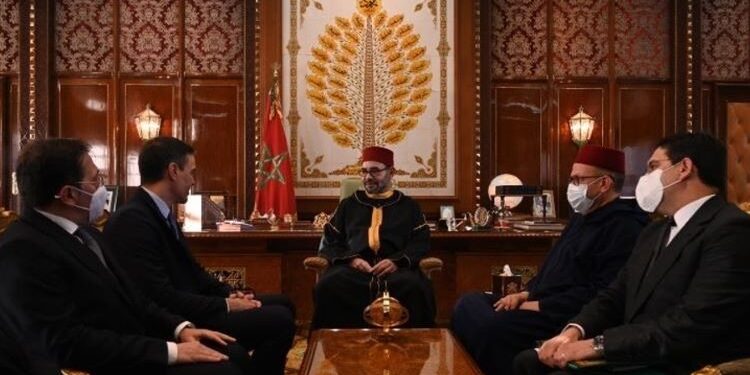The Diplomat
The long-awaited High Level Meeting (RAN, for its acronym in Spanish) between Spain and Morocco, the first in almost eight years, will take place on February 1 and 2 in Rabat and will be attended by “a dozen ministers” of the Government of Pedro Sánchez, as announced yesterday by the Ministry of Foreign Affairs in a very brief press release and confirmed to journalists by the Minister of Foreign Affairs himself, José Manuel Albares.
“This is the first meeting of this kind since 2015 and is one of the major milestones of the roadmap agreed with Morocco last April,” said José Manuel Albares yesterday from Niger, the first stage of a tour of Sub-Saharan Africa that will conclude today in Nigeria and Guinea-Bissau.
The last RAN between Spain and Morocco was held in June 2015 and the next one had been scheduled, in principle, for December 2020, but since then it suffered several postponements because of the COVID-19 pandemic and the very deep diplomatic crisis that erupted in April 2021 after Spain’s decision to host in a hospital in Logroño the leader of the Polisario Front, Brahim Ghali, for humanitarian reasons.
The turning point came in March 2022, with the Spanish government’s decision to accept the Moroccan autonomy plan for Western Sahara as “the most serious and realistic basis” for a solution to the conflict. As a consequence of this “thaw” (one of the consequences of which has been the serious diplomatic crisis with Algeria, the main gas supplier to Spain), President Pedro Sanchez and King Mohamed VI adopted, on April 7 in Rabat, a bilateral roadmap that laid the groundwork for the recovery of diplomatic relations and paved the way for the holding of the High Level Meeting. The RAN was first announced for November last year, but was finally set for early 2023.
Absence of Yolanda Díaz
Albares did not specify exactly which ministers will participate in the meeting with their Moroccan counterparts, although he was convinced that “there will be many ministers because of the quality of relations with Morocco”. In any case, the head of diplomacy warned that “delegations are never composed of all the ministers” and that the presence or absence of each member of the Government “depends on the agenda”. As for the specific issues of the summit, Albares specified that “a good number of agreements are expected to be signed”. Foreign Affairs sources consulted by The Diplomat could not provide further details, but it is estimated that around a hundred bilateral agreements could be finalized.
What is certain is that the Second Vice-President and Minister of Labor, Yolanda Díaz, has already announced that she will not participate in the meeting and everything points to the fact that neither will the Minister of Social Rights and leader of Podemos, Ione Belarra, nor the head of Consumption and federal coordinator of IU, Alberto Garzón, the other two members of the minority partner of the Government, Unidas Podemos. Regarding this point, Albares recalled yesterday that “the vice president has been in some summits and not others”. “Ministers who have issues to discuss with their counterparts will go. I don’t know the issues that the Ministry of Labor has at the moment,” he added.
The new stage
Since the resumption of good relations, Albares (who came to office in July 2021, with the diplomatic crisis in full swing) has held as many as eight bilateral meetings with his Moroccan counterpart, Nasser Bourita. The last meeting took place last November 28, when the Moroccan minister took advantage of a stopover in Madrid to meet with the Spaniard and continue advancing, among other matters, on the details of the High Level Meeting.
As a consequence of the implementation of the road map, Albares and Bourita agreed last September in New York the gradual and partial resumption of the passage of goods through the land customs posts, which will imply the reopening of the customs office in Melilla and the opening of the first customs office in Ceuta. For the time being, the customs offices remain closed, but the two governments have expressed their desire to open them early this year, if possible before the RAN.
Likewise, in recent months, working groups have met on several areas of bilateral interest, such as the delimitation of territorial waters on the Atlantic coast or migration issues. According to the minister, since the beginning of the “new stage in relations”, irregular arrivals of migrants have decreased by around 25% and trade has increased by 30%.
In any case, the Spanish government has been very careful, in recent months, to avoid any step backwards in its idyll with Rabat. A good example of this was the controversy that erupted in mid-2022 over Morocco’s possible involvement in spying on Spanish politicians (the Pegasus case), an issue that Albares has tried to avoid at all times with the argument that “international relations are based on facts, not conjecture”.





